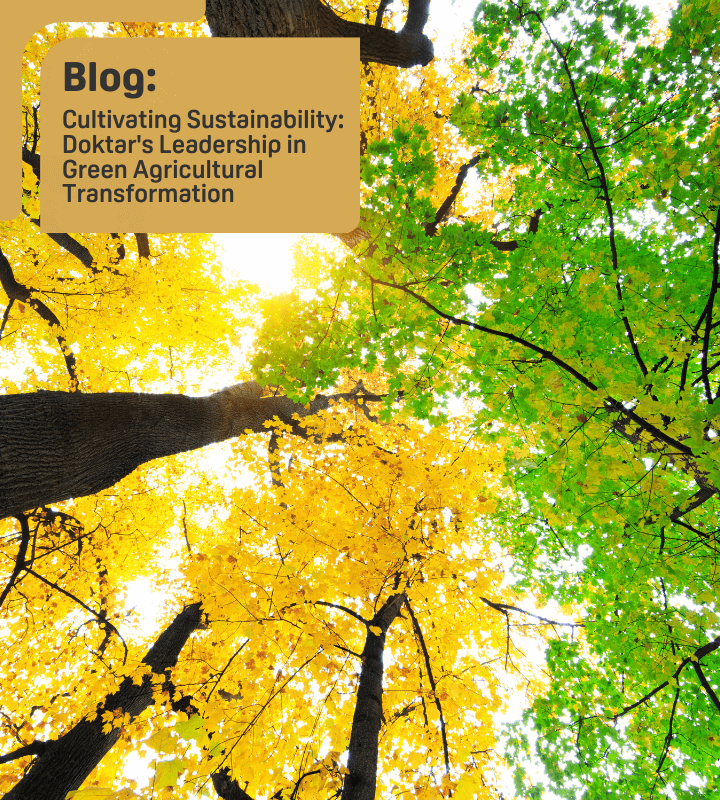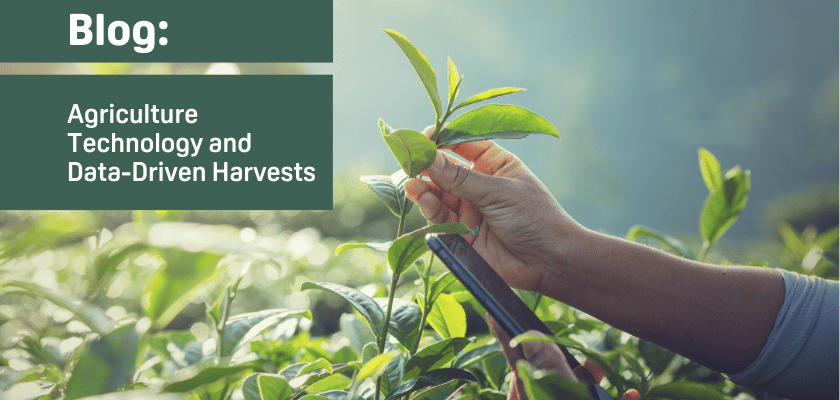

Cultivating Sustainability: Doktar's Leadership in Green Agricultural Transformation
Doktar’s co-founder Tanzer Bilgen recently participated in the talk on “Digitalization and Sustainability in Agriculture and Finance.” Bilgen provided an insightful analysis of the current agricultural ecosystem, highlighting the challenges in digitalization, and Doktar’s pioneering role in digital and green transformation in the sector.
Published on 01 March 2024
Doktar’s co-founder Tanzer Bilgen recently participated in the talk on “Digitalization and Sustainability in Agriculture and Finance.” Bilgen provided an insightful analysis of the current agricultural ecosystem, highlighting the challenges in digitalization, and Doktar’s pioneering role in digital and green transformation in the sector.
Before we dive into the details of the talk, let’s have a look at how Doktar perceives green transformation.
In the dynamic realm of agriculture, the call for sustainable practices has transcended buzzword status to become a global imperative. As environmental challenges loom large, the agricultural sector finds itself at the forefront of a crucial paradigm shift towards green transformation. The urgency to adopt digitalization and sustainable practices has never been more evident, and recent discussions illuminate the pivotal role companies like Doktar play in navigating this transformative journey.
The Significance of Green Agricultural Transformation
Green transformation in agriculture is not merely a trend; it represents a fundamental reimagination of how we cultivate and consume food. With the escalating impacts of climate change and the specter of resource scarcity, the agricultural sector faces increasing pressure to innovate. This transformation entails integrating sustainable practices, reducing carbon footprints, and ensuring the long-term viability of farming methods.
In this context, the European Union's regulatory framework emerges as a catalyst for change, propelling the agricultural industry toward comprehensive digitalization. Addressing critical compliance issues such as pesticide and fertilizer application, this regulatory impetus propels the sector towards a future where sustainability is not just an aspiration but an integral part of everyday operations.
Doktar's Distinctive Approach to Green Transformation
Enter Doktar – a trailblazer in the realm of digital and green transformation. Beyond being a technological innovator, Doktar occupies a unique position, deeply committed to educating the industry and farmers alike. Departing from the conventional startup model, Doktar embraces a 'sector-up' strategy, aspiring to revolutionize the entire agricultural ecosystem.
Key Takeaways from the Talk 🌱
Panorama of Green Transformation
Tanzer Bilgen, Doktar's co-founder, delved into the transformative impact of the EU's regulatory framework. This dynamic shift towards digitalization addresses compliance intricacies, propelling the sector into a new era of sustainable agricultural practices on a global scale.
Enhancing Transparency and Traceability
Doktar's forte lies in creating digital twins of fields, seamlessly amalgamating diverse data points into actionable knowledge. Real-time systems offer profound insights into agricultural practices, fostering transparency and accountability throughout industry.
Addressing Challenges in Green Transformation
Acknowledging challenges, such as CEOs deprioritizing environmental pledges due to a lack of structured digital transformation strategies, Bilgen emphasized the need for cohesive, forward-thinking approaches. This void often resulted in greenwashing, where quantifying the tangible impact of initiatives became a challenging task.
Doktar’s 3 Pillars of Green Transformation Model
-
Creating Digital Hectares
Doktar pioneers the creation of digital hectares for agricultural fields, employing cutting-edge technology to replicate and digitize the physical environment of each farm. By integrating various data points such as soil composition, weather conditions, and crop health, Doktar develops comprehensive digital models. These digital twins enable farmers to make informed decisions, optimize resource utilization, and enhance overall agricultural efficiency.
-
An Integrated Solution
Doktar's commitment to a 360-degree solution involves addressing every facet of the agricultural ecosystem. From precision farming techniques to supply chain management, Doktar employs an integrated approach. This holistic solution ensures that sustainable practices are implemented at every stage of the agricultural process. By offering a complete suite of services, Doktar empowers farmers with the tools and knowledge needed for comprehensive and sustainable agricultural practices.
-
Making Tangible and Measurable Impact
Doktar emphasizes the importance of measurable impact in its green transformation model. Through the implementation of advanced analytics and monitoring systems, Doktar enables farmers to quantify the outcomes of their sustainable practices. This pillar ensures that the shift towards green agriculture is not merely theoretical but results in tangible benefits, such as reduced carbon footprint, improved soil health, and enhanced crop yields. Measurable impact is at the core of Doktar's mission to drive real change in the agricultural sector.
Introducing Climate and Sustainability Initiatives (CSI)
In the past year, Doktar established a robust program management office, aimed at facilitating cultural transformation in FMCG businesses. This initiative, powered by Doktar's cutting-edge technology and a dedicated team of fieldworkers, ensures constant communication with farmers and agronomists.
The CSI doesn't merely stop at deploying technology; it's a holistic approach that integrates sustainable practices at every step of the agricultural value chain. From educating farmers on eco-friendly cultivation methods and digital & financial literacy to implementing real-time monitoring systems that track and reduce water usage, Doktar's Climate and Sustainability Initiatives aim to create a lasting impact on the environmental footprint of agriculture.
Moreover, this initiative is unique in its self-sufficiency. Doktar's model doesn't rely on external partners for technology, implementation, or validation. It stands as an all-encompassing service, functioning as a one-stop-shop for comprehensive climate pledges and digital transformation, a strategy that is gaining global recognition and momentum.
Conclusion
Doktar stands as a beacon of green transformation in agribusiness, seamlessly aligning technology with sustainability. As we navigate the path towards a digitally advanced and environmentally conscious agricultural landscape, Doktar's commitment to education, transparency, and measurable impact sets a benchmark for the industry. The journey towards cultivating a greener, more sustainable future for agriculture is not just a destination; it's a shared responsibility, and Doktar is leading the way.
For those interested in exploring how Doktar's innovative solutions can transform your agricultural practices, visit our website for detailed information on all our products. Stay updated with the latest developments by following us on Instagram and LinkedIn, where we share insights, tips, and updates about our technologies and their impact on modern farming.

Agriculture Technology and Data-Driven Harvests
The convergence of agriculture technology and data-driven solutions represents the next frontier of innovation in farming. With companies like Doktar leading the way, farmers can leverage these advancements to improve productivity, reduce environmental impact, and secure a more sustainable future for agriculture. Whether through precision agriculture, sustainable agriculture, or cutting-edge smart agriculture technology, the future of farming is bright, and data is at the heart of this transformation. Technology's positive impact on this future should inspire and motivate us all.

Integrating Crop Health Monitoring Systems for Better Farm Management
Crop health monitoring systems revolutionize modern agriculture by enabling real-time insights into plant health, reducing losses, and promoting sustainability. Tools like Doktar’s CropMap and Orbit integrate advanced technologies, empowering farmers with data-driven decisions. By enhancing efficiency and sustainability, these systems are essential for future-proofing agricultural operations.

Modern Agriculture: Innovative Solutions to Combat Global Food Insecurity
Modern agriculture combats global food insecurity with precision agriculture, sustainable practices, and biotechnology. Tools like IoT, automation, and crop innovations optimize resource use, enhance resilience, and ensure stable food supplies. By integrating smart technologies, agribusinesses address challenges like climate change and resource scarcity, paving the way for a sustainable food future.
